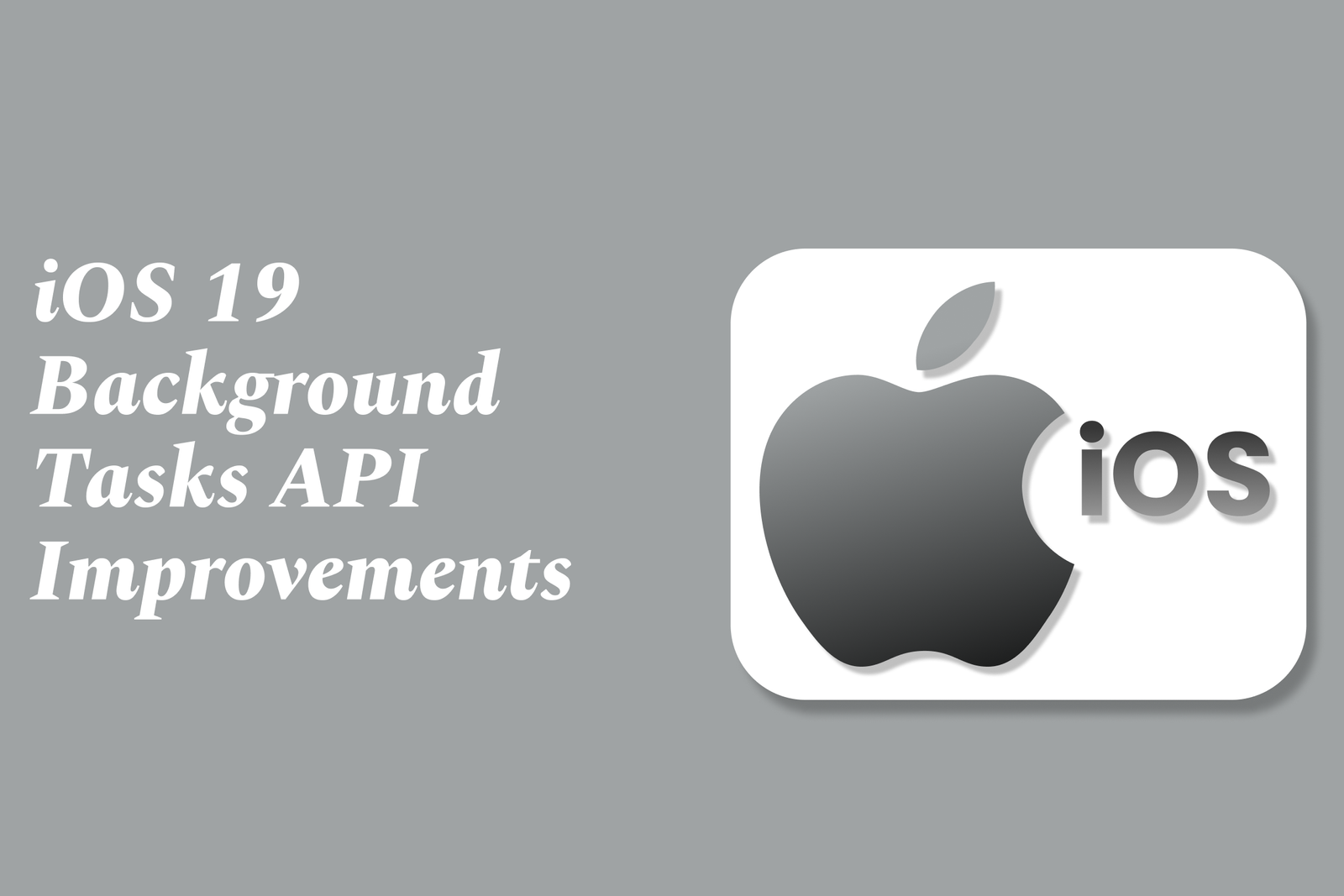iOS 19 background tasks API improvements
iOS 19 enhances the Background Tasks API by improving task scheduling, power efficiency, and reliability. It enables apps to perform deferrable, periodic tasks more effectively in the background, optimizing battery usage while ensuring smoother and timely execution.
iOS 19 Background Tasks API Improvements
1 ) Enhanced Background Task Management
Apple has improved the Background Tasks API in iOS 19 to provide developers with more reliable and efficient execution of background tasks. These enhancements are aimed at optimizing power consumption while supporting deferrable operations like data downloads, background updates, and routine app maintenance.
2 ) Use of BGTaskScheduler API
The updated API leverages the BGTaskScheduler framework to better manage background processing according to system resource availability and usage patterns. This makes background tasks more predictable and less likely to be interrupted, contributing to a smoother user experience.
3 ) Improved Power Efficiency
One of the major focuses of the improvements is power efficiency. The system intelligently schedules and executes background tasks, balancing between task execution needs and preserving battery life.
4 ) Support for Deferrable and Periodic Tasks
Developers can now register tasks with minimum intervals allowing the system to batch operations intelligently. This means apps can perform tasks such as syncing data or cleaning caches at ideal times without manual intervention or risking excessive battery drain.
5 ) Integration with Other System Services
The improvements facilitate better integration with services like App Updates, enabling apps to check for and fetch new versions in the background, thereby enhancing the end user update experience.
6 ) Developer Tools and APIs
The update includes enhanced tools for task registration and management, making it easier for developers to define background tasks, check registration status, and handle task execution with newer API methods.
In summary, iOS 19 brings significant upgrades to the Background Tasks API by improving task reliability, power management, and developer control, enabling apps to perform essential functions effectively even while running in the background.
https://justacademy.in/news-detail/flutter-developer-roadmap-after-2025
https://justacademy.in/news-detail/android-quick-settings-customization
https://justacademy.in/news-detail/react-native-app-size-reduction-strategies
https://justacademy.in/news-detail/firebase-updates-for-flutter-apps
https://justacademy.in/news-detail/react-native-2025:-what-meta?s-big-push-means-for-developers
Related Posts
Java supports GDPR and data privacy by enabling secure data handling through encryption, controlled access, and precise data management. It allows developers to minimize PII exposure, ensure data confidentiality, and design workflows that comply with data protection regulations effectively.
Java code quality tools have evolved to include advanced static analysis, integrated security checks, and AI-powered code reviews. These updates help developers detect bugs, enforce coding standards, and enhance security, streamlining the development process and improving overall code reliability.
Java remains a cornerstone in big tech companies, evolving with modern features like records, pattern matching, and virtual threads. Its robust ecosystem, enhanced performance, and growing AI integrations keep it vital for both legacy systems and innovative new projects.
Java and CI/CD pipeline optimizations streamline Java application development by automating builds, tests, and deployments. They improve efficiency through parallelization, caching, and secure secrets management, enabling faster feedback loops and more reliable, scalable software delivery.
Java supports modern cryptography standards through its flexible Java Cryptography Architecture (JCA), enabling integration of advanced algorithms like AES, EdDSA, and post-quantum tools. Libraries like Bouncy Castle offer FIPS-certified, hardware-accelerated implementations for secure development.
Java 23 enhances record patterns by enabling concise, direct destructuring of record components within pattern matching, simplifying type checks and data extraction. This improvement boosts code readability and expressiveness by reducing boilerplate in handling immutable data classes.
Java remains a top choice for mobile app backends, powering scalable, secure, and high-performance server-side solutions. Latest trends include cloud-native microservices, reactive programming, and enhanced JVM optimizations, enabling efficient, flexible, and robust mobile backend development.
Java SE 24 and LTS Java SE 21 offer enhanced features and performance, while Apache Spark 4.0.0 introduces Scala 2.13 support and advanced ML and SQL capabilities. Together, they empower developers to build scalable, high-performance data applications with modern tools.
JUnit 5 modernizes Java testing with a modular architecture, improved assertions, and seamless Java 8+ support. Beyond JUnit, tools like Mockito and AssertJ enhance mocking and assertions, creating a powerful, flexible ecosystem for writing clean, efficient Java unit tests.
Java plays a pivotal role in cloud automation tools by providing a robust, platform-independent language used to build scalable automation frameworks like Jenkins and Selenium, enabling efficient CI/CD pipelines, testing, and orchestration across diverse cloud environments.










